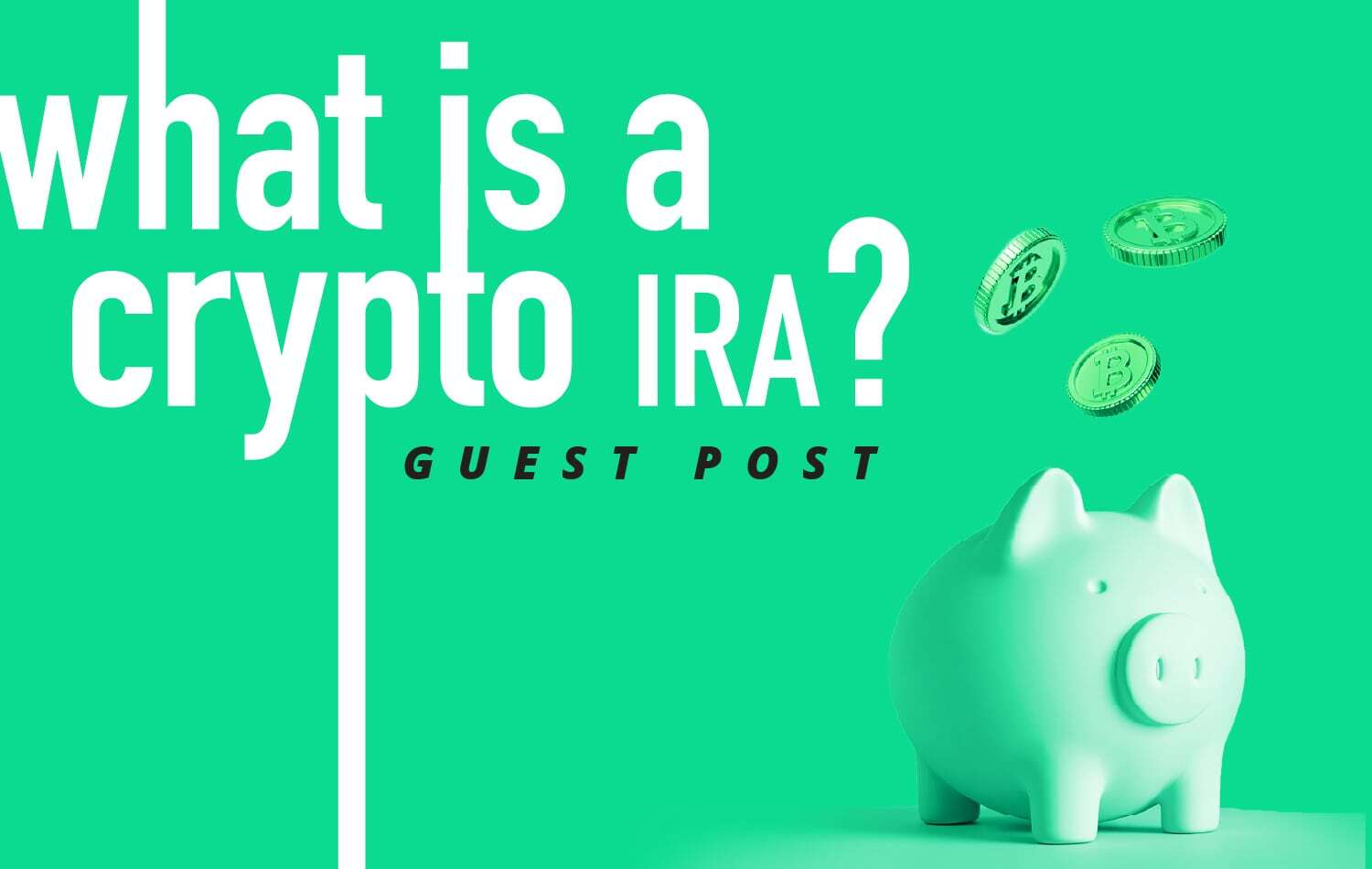Opening a crypto IRA is something to consider if you don’t mind taking a little risk now in exchange for potentially larger returns later as well as some serious tax advantages on the way.
Typically, planning for your retirement means opening up some sort of retirement account and choosing a retirement planning strategy, perhaps even employing the advice of a financial planner. Historically, that meant turning to traditional financial institutions for your needs. But many say cryptocurrency is the way of the future—so why shouldn’t it play a role in our future financial planning, too? One product that’s bridging the gap between the new and traditional worlds of finance is a crypto IRA, a modern spin on traditional IRAs (individual retirement accounts).
If you’re scratching your head wondering what a crypto IRA is and how it works, it’s for good reason. A traditional financial product like an IRA may seem downright alien in the world of crypto. But opening a crypto IRA is something to consider if you don’t mind taking a little risk now in exchange for potentially larger returns later as well as some serious tax advantages on the way.
What is cryptocurrency?
At its core, cryptocurrency is a digital asset or currency that you can invest in, trade, or spend on goods and services. Crypto is decentralized, meaning its value is not tied to a particular nation’s market, economy, or currency. And it’s based on blockchain, which is a ledger technology that allows for the transfer, sharing, and tracking of P2P (peer-to-peer) transactions.
Cryptocurrency has quickly become a legitimate asset for investors globally, with institutional finance warming up to crypto as a valid part of the overall financial system. Investors attracted to the decentralized nature of crypto but wary of its potential for risk and short list of practical uses have found solace in the number of traditional financial products being built for crypto, such as crypto IRAs and automated cryptocurrency tax platforms like TaxBit.
How does a crypto IRA work?
Like any IRA, a crypto IRA is simply a retirement account in which you invest and store crypto. You’ll face the same standards as if you were investing in any other usual asset class, including the tax benefits. Some differences include storage—as with any cryptocurrency, your assets are typically stored in a digital wallet—and the use of a crypto exchange over the stock market in conjunction with your custodian, the holder of your IRA.
What are the benefits of a crypto IRA?
There is one main benefit of a crypto IRA that can’t be overstated: the future potential of cryptocurrency as an asset class at large. While a shifting legal landscape, environmental concerns, and an uneven global attitude toward recognizing crypto as currency lend to its volatility, crypto has overall increased in value, popularity, and legitimacy at a steady upward trend.
If this trend continues, the potential returns come retirement for those who invested in a crypto IRA are huge.
Aside from its potentially high returns, there are several other advantages of investing in a crypto IRA.
Tax benefits
For those looking to minimize their crypto taxes, a crypto IRA is one safe way to see some tax advantages.
Because crypto is classified as property by the IRS, your earnings are subject to either short-term and long-term capital gains tax. However, investing your crypto into a Traditional or Roth IRA can be a tax advantageous situation.
While both Traditional and Roth Crypto IRAs offer tax benefits, the timing of receiving the tax benefits varies. A Traditional Crypto IRA offers more immediate tax benefits since crypto contributions are tax deductible and you defer paying taxes until you access the funds when you retire. Contributions to a Roth Crypto IRA, on the other hand, are not tax deductible. However, you receive greater tax benefits down the road by avoiding paying the capital gains tax on any increases in value when you do access the funds.
If you’re looking for more ways to minimize your crypto taxes, you may want to consider a strategy called crypto tax-loss harvesting, in which you sell your assets at a loss to offset your capital gains.
A cryptocurrency tax software like TaxBit makes this easy by helping you identify tax-loss harvesting opportunities throughout the year, track your crypto portfolio, and auto-generate your tax forms come tax season.
Decentralization
Decentralized finance, or DeFi, is at the core of what makes investing in crypto so appealing to many. The promise of decentralization attracts investors to these types of assets because, in theory, this means third-party interference or one central point of control is minimal compared to traditional financial markets.
Ideally, investors themselves would then be the main driving factors of the market without manipulation. Whether or not Bitcoin, Ethereum, and other digital currencies end up fulfilling this promise remains to be seen.
Security
Blockchain is a secure way to make transfers between two parties with minimal risk of tampering. Each block that forms a blockchain is built upon the information of the block before it, so altering the data of any block would require manipulating an entire chain, making transactions easy to track and verify as authentic.
Blockchain has many other useful applications, but its ability to conduct secure transactions is highly valued in many sectors, including financial products like investment accounts, where transfers and the storage of large sums of capital may be otherwise at risk.
Portfolio diversification
A diversified portfolio tailored to your risk tolerance as well as your current and future financial goals is the gold standard for successful investment strategies. Using a crypto IRA as part of your overall strategy or even in conjunction with a more traditional retirement plan is a great way to possibly increase your returns by diversifying your portfolio and expanding to include alternative investments.
What are potential risks of a crypto IRA?
It’s best to be aware of the risks of any investments you make, but there are special considerations when choosing crypto investments as part of your retirement plan. Some issues include high fees and (as of right now) a more limited use case than other assets, but the main issue to consider for a crypto IRA is volatility.
Volatility
Crypto is volatile due to its decentralized nature—it lives and dies on many factors, but the paths of various cryptos are unpredictable at best. As we’ve seen, something as simple as a tweet from the right (or wrong) person can tank crypto prices rapidly. This is true for most assets, but typically, a standard investment portfolio or retirement account is diversified across a carefully selected ratio of asset classes, within which many companies reside. This means that one bad press day for a company or sector likely won’t tank a properly diversified portfolio.
But depending on how you invest in crypto, a bad day could spell serious trouble for your crypto IRA if you don’t employ the right strategies.
As with all investment and trading, it’s best not to put your eggs in one basket, so to speak. Protect yourself against volatility by including your crypto IRA in part of a larger strategy built to handle the wild ups and downs that come with crypto.
How do crypto IRA taxes work?
To understand taxes and crypto IRAs, you have to understand both cryptocurrency tax law and the tax status of different kinds of retirement accounts. Remember: the IRS currently considers Bitcoin as property, so it’s normally subject to the same types of capital gains taxation as other asset classes.
But when it comes to IRAs, things are different. IRAs are tax-advantaged, although this looks a little different depending on which type of IRA you choose. Traditional and Roth IRAs are the most common types of retirement accounts and each has their own tax benefits.
Traditional crypto IRA
With a Traditional Crypto IRA, your contributions are often tax deductible. This means you can deduct your annual contributions from your taxable income and you don’t pay income taxes on your earnings until you withdraw your funds. Withdrawing prematurely, or before you’re of retirement age, could result in a penalty and a tax liability on the value of the funds withdrawn. There are annual contribution limits based on your filing status and annual income.
Roth crypto IRA
With a Roth Crypto IRA, you avoid capital gains taxes on your earnings and all distributions at retirement are tax free. However, unlike a Traditional IRA, you may not deduct the contributions you make to your account from your income.
Fund your future with a crypto IRA
If you’re comfortable enough with investing in and trading crypto and are looking for a way to diversify your retirement fund, a crypto IRA is the perfect tool. Most people start by setting up a self-directed IRA, which supports alternative investments like crypto. While some volatility may make crypto a riskier investment than you’d normally see in a retirement account, its promising future and tax advantages make it a great choice for anybody looking to capitalize on their income now and enjoy it later.
Guest Post by Chelsi Walker, Benzinga Contributor: The views and positions expressed within guest posts are those of the author and do not represent those of TaxBit. The completeness and validity of any statements made within guest articles is not guaranteed.
.png)


